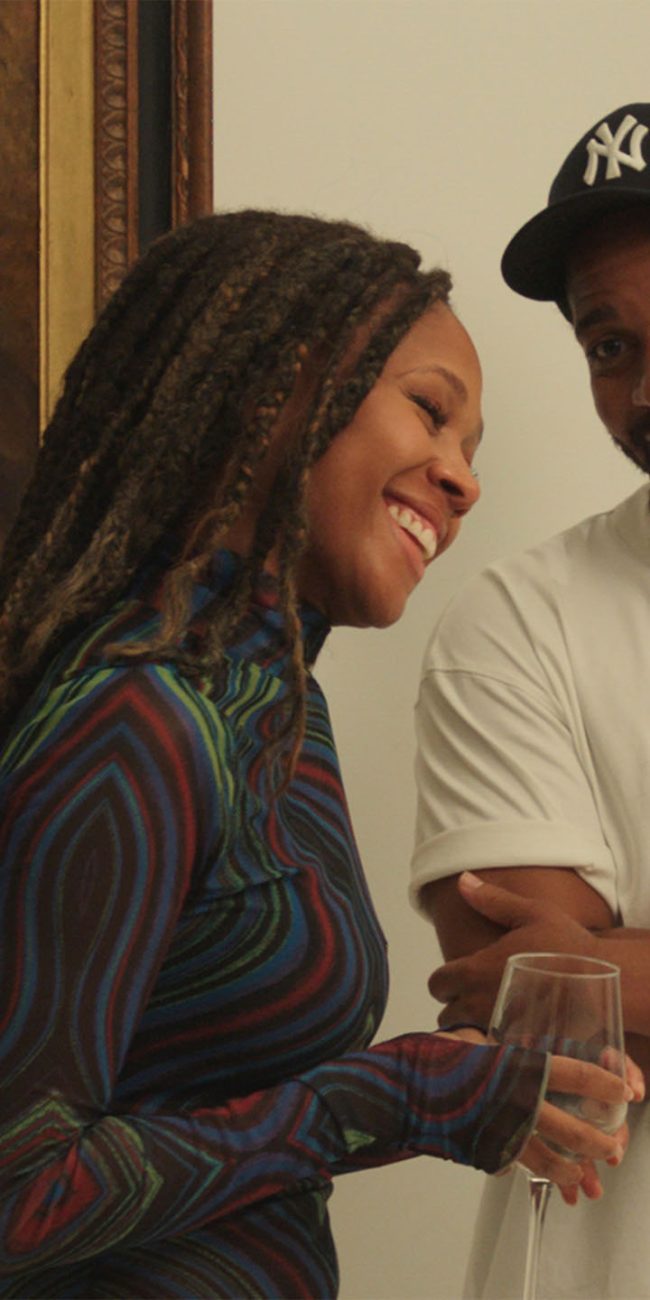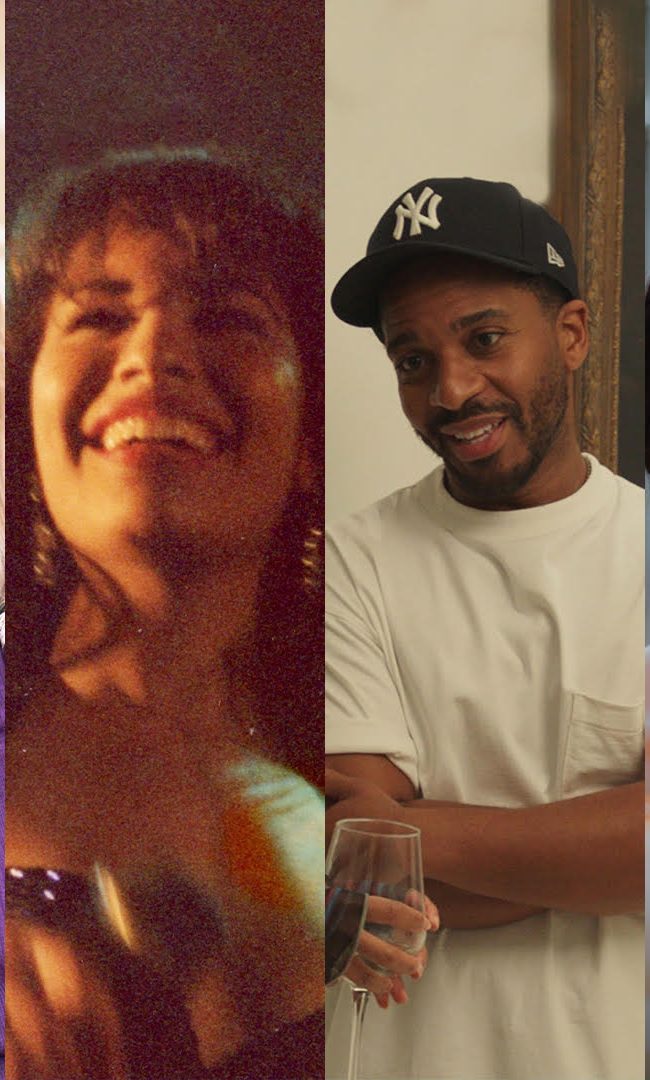A Conversation with Channing Godfrey Peoples (MISS JUNETEENTH)
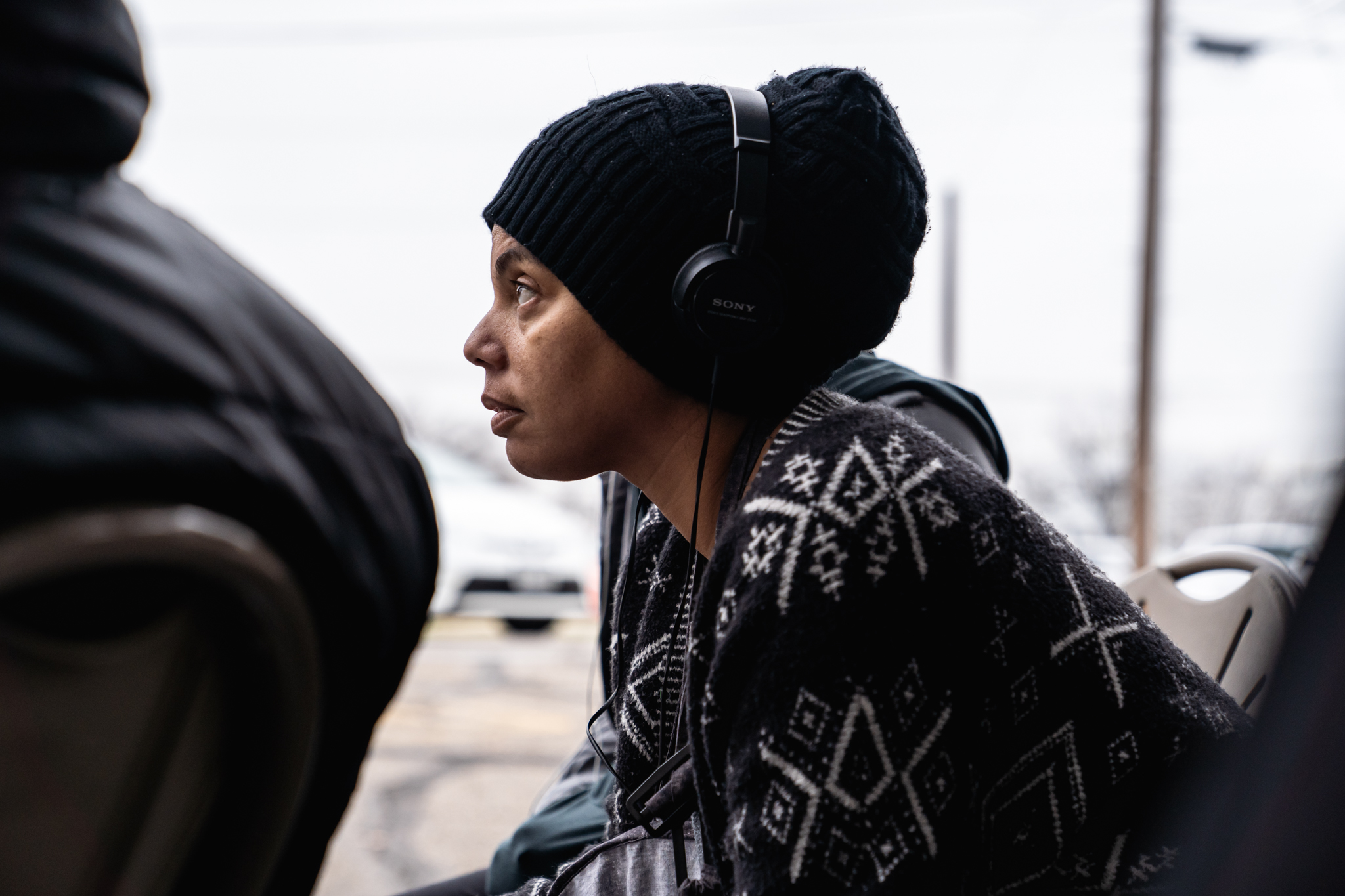
I recently spoke with director Channing Godfrey Peoples by phone about her debut feature, Miss Juneteenth (which I also reviewed), which premiered at the 2020 Sundance Film Festival and just came out on VOD on…June 19! This powerful movie follows the story of Turquoise Jones as she confronts the challenges of motherhood while living with the burden of her own squandered potential (as she sees it). As the annual “Miss Juneteenth” beauty pageant of Forth Worth, Texas, rolls around again, she decides that her daughter Kai should go for the crown, just as she, herself, once did. The only problem is that Kai has other ideas. With lyrical, cinematic strokes, Peoples paints an evocative domestic canvas that is also a profound examination of African American life. Here is a condensed digest of our conversation, edited for length and clarity.
Hammer to Nail: What was your original motivation to tell this particular story?
Channing Godfrey Peoples: Juneteenth has been a part of my life since I can remember, since I was a child, and there are so many parts of it that I remember fondly, like the parades and the food, the barbecue, and there was a sweet potato pie cooking contest and there are things like the cane fishing pole contest. Just all these wonderful things. There’s blues music and dance that I just have fond memories of and even cherish as an adult. I think the fondest memory I have of commemorating Juneteenth was the Miss Juneteenth pageant, itself, and that was because there were just all these young, beautiful black women that were symbols for me of hope for the future and literally what I could be. I saw their beauty and their talent and their intelligence, and I just saw possibilities for myself and I guess it’s just something that stayed with me for most of my life.
HtN: This is a particularly timely moment for the film to come out, but of course films take a while to make, so this is just…I hate to say serendipity, because the reasons for which this is timely are hardly joyful…but since films take a long time to make, I’m just curious, how long have you been working to get this to the screen?
CGP: You know, I probably started writing the film around 2013, so it was probably a seven-year journey. And let me tell you in those seven years what I was doing. My husband serves as a producer on the film, his name is Neil Creque Williams. He produced with Sailor Bear, which is David Lowery and his producing team Toby Halbrooks and James Johnston. Neil and I met in film school and he’s from North Carolina and we really bonded over making black southern stories, or wanting to make black southern stories that highlighted historical moments, and also had a strong sense of culture and being able to see that in as a human way as possible. And we really pushed the film up the hill together, to be honest, because after I wrote it, I shared it with Neil, he’s my trusted person, and he said, “Well, we should send it out to development programs for consideration and also competitions and we could get notes from those programs and that would help us define the film.”
I’d written this film that I thought was easily accessible and I could make. It was in the neighborhood that I grew up in and it was around the places and spaces in which I grew up. So I was like, “Oh, we’ll just go shoot the film.” And then once we started submitting it to these different programs, we got into the Austin Film Society, and San Francisco Film Society was supportive and the Sundance Institute, obviously. Neil was in their creative producing lab and I was in the screenwriting and directing intensives with the film and I think it really helped push the film forward. Sundance connected us with Sailor Bear who then took the film to the financier…and we’re here.
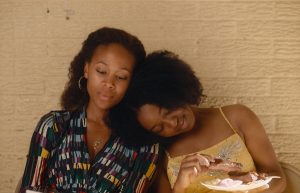
A still from MISS JUNETEENTH
HtN: So, this is your first feature, and though you are working with Neil and some people who’ve made features before, I’m curious what the process of getting funding and putting it all together was like.
CGP: Yeah, this is Neil’s first feature, as well, but Sailor Bear, obviously, has a wealth of experience with films, both big and small. You know, David Lowery made A Ghost Story and The Old Man & the Gun, and they’ve just done lots of little films and produced smaller films, as well. But I was also writing a film with a black woman lead and those are far and few between, so there’s that aspect of it. And I was also writing a film about a community that’s not often seen on camera and so that made it a bit more difficult.
We were also writing about Juneteenth and people now, as a result of these tragedies that you so eloquently brought up, are more familiar with it, but we’ve always had to educate people on what Juneteenth was. So I think all those elements made it more difficult to get the film financed right away. And it wasn’t until we really got through the development programs and people really saw the film and helped us, saw more value in the film and helped us protect it in a way that we were able to really find partners to make the film.
HtN: You mentioned it’s difficult to get a film with a black woman lead made. What was your process of casting like? Who did you look at? How did you decide on your eventual actors?
CGP: I mean, we looked far and wide. I knew early on I was making this very human story about this woman who is navigating her emotional journey and disappointments, the hurt of navigating this lost dream. Most importantly, I needed her to be able to convey the joy and the love for her daughter, you know? And so I really was looking for an actor with nuance and I was familiar with Nicole Beharie’s work and knew that she was able to bring the kind of nuance that I was seeking. I also am a director that likes for actors to be able to sit in moments, and really, I have this approach, this naturalistic approach, because I believe in authenticity and trying to bring as much truth as possible to my work, and so Nicole is someone who’s just really able to navigate that journey and she’s also someone who can say so much with just the look. So that’s just how she came to the casting.
HtN: Well, I think she’s really, really quite fine in the role and does quite a lot without speaking, just through behavioral performance, which I always appreciate. I also like Kendrick Sampson, as Ronnie, and Alexis Chikaeze, as Kai. This is her first film, right? How did you find her?
CGP: Yes, she’s an activist from Dallas and yes, it’s her first film, which is still astounding, because my undergrad is in theater, so I love working with actors who have just a wealth of experience and Nicole is Juilliard-trained and things like that. But it was a new thing for me to work with an actor who’s just breaking out, but I felt strongly about Alexis early on in reading for the role, just because I felt as a person that I wanted to reach out to her. And she literally, I’m sure she was completely nervous, but she just jumped in and started acting and I think she did such a beautiful job. Kendrick, too. I mean, he’s an actor who I think brings nuance, who brought nuance to his role and I’m really happy with his performance.
HtN: As you should be, because he takes a part that could be…well, I mean, you write him so that he’s sympathetic, but certainly I think he brings to the part a real humanity, as well.
CGP: Totally, I’m so glad that you get that because that’s what I was looking for, someone who could really lift that character off the page because I really, as a filmmaker, like to see things, like to paint in shades of gray; everything’s not just black and white, and I was really trying to bring humanity, to portray these characters in as a human way as possible.
HtN: Yeah, and I think it really works. Speaking of the script, it is, I think, particularly fine because it doesn’t overly explain things. You talk about writing in shades of gray; I feel often, too often, when I’m watching films, that there’s exposition up there on the screen that should have eventually moved into subtext, but doesn’t, perhaps because they just didn’t get to that next draft. In your screenplay, I feel like there’s just enough said for us to understand enough, but not so much said that we feel like we’re being told the whole story. So what was your process of bringing the text into subtext?
CGP: I mean, it’s interesting because like you’re saying, there are several drafts where everything is overly explained: every I is dotted, every T is crossed; you know, every single detail of Turquoise’s journey. What I really found, in making this film about this woman who was reconciling who she was in the past and finding a new way to dream, is I was constantly weighing how important the details were of the past, in the script. I wanted to be able to go on this journey with her and look at what new possibilities could open up for her, and so I thought it was important that a lot of those details of the past just … we feel them, but we’re not explicitly saying what happened and when.
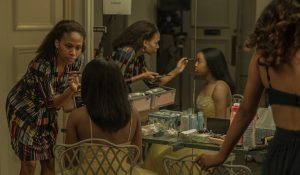
A still from MISS JUNETEENTH
HtN: And the relationship between Turquoise and Ronnie is a case in point. We never really know why they’re not living together, but we don’t need to, and so I really appreciate that. What I also appreciate about your film is, as you said, it’s this portrait of black, southern life on the screen, something that we don’t see enough. I’m curious about the casting of the two parts, I guess three, because there were two people in the pawn shop, played by white actors: the dressmaker and the pawn shop guys. How deliberate was your casting of those parts?
CGP: I talk about authenticity, and I was really approaching what kind of folks that I’ve seen in those spaces. And so we were shooting on location and that particular pawn shop is…the south side is a historically black community and I imagined Turquoise going to another part of town to a pawn shop so that she wouldn’t be seen by other folks that she knew. And so that pawn shop was in a different part of town. It’s interesting: Fort Worth, itself, in which the story is set, is a big city, but this small black community makes it feels like a country town. So that was more of my reason for casting those particular parts. And coincidentally, the pawn shop folks are folks that actually own that pawn shop.
HtN: Got it. That makes sense. I was just wondering, given the lines that Wayman (Turquoise’s boss), when he’s talking about his distrust of taking loans and money from white folks, says about the American dream not existing for African Americans. I was just curious if those were sort of subtle, additional subtexts about that, but no, that makes sense. Well, I really enjoyed the film and I hope that your film gets all the attention that it deserves.
CGP: Thank you so much!
– Christopher Llewellyn Reed (@ChrisReedFilm)








